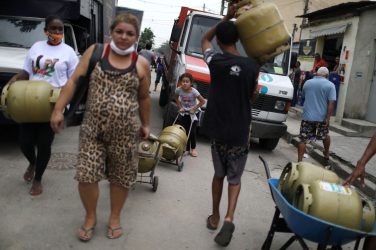 Seven years before the deadline for the Millennium Development Goals (MDG), Brazil is showing improvement in issues such as poverty and inequality. The conclusion features in the third edition of the follow-up report elaborated by the Presidency of the Republic and by the United Nations (UN), which was disclosed August 29.
Seven years before the deadline for the Millennium Development Goals (MDG), Brazil is showing improvement in issues such as poverty and inequality. The conclusion features in the third edition of the follow-up report elaborated by the Presidency of the Republic and by the United Nations (UN), which was disclosed August 29.
The MDG were launched in the year 2000, during the Millennium Summit of the United Nations. In the occasion, 189 countries set eight different goals. The first one is to eradicate extreme poverty and hunger.
In order to attain the goal, the objective set for the period between 1990 and 2015 is to reduce by half the share of the population that has an income lower than 1 US$ PPP (purchasing power parity) per day.
The value is a global indicator aimed at eliminating price disparity between different countries – in 2005, 1 US$ PPC per day was the equivalent of 40 Brazilian reais per month, which configures a situation of extreme poverty.
Based on data supplied by the Brazilian Institute of Geography and Statistics (IBGE) and the Pnad (National Household Sample Survey), the study shows that, taking the US$ PPC into account, the amount of Brazilians living in extreme poverty has decreased from 8.8% to 4.2%. And it concludes that Brazil has already reached the goal set by the UN.
Using the minimum wage as a parameter, the extreme poverty rate decreased from 28% to 16% of the population, and the poverty rate, from 52% to 38%. In Brazil, extreme poverty has been measured as a per capita income equivalent to one quarter of the minimum wage, and extreme poverty, as a one half of the minimum wage – respectively, 89.60 reais (US$ 45) and 179.21 reais (US$ 90) in 2005.
The survey also points to a decrease in patterns of inequality between 2001 and 2005. Whereas the income of the 10% poorer grew at an annual rate of 9.2%, that of the 10% richer fell by 0.4% per year.
The Gini coefficient, one of the world's most widely used measures of inequality, reached 0.566 in 2005, after an upward trend that began in 2001. Until then, it oscillated around 0.595, which, according to the survey, kept Brazil among the most unequal countries in the world. The Gini coefficient varies from 0 to 1. The closer the coefficient is to 1, the smaller the inequality.
Another conclusion is that malnutrition in children aged less than one year decreased from 10.1% in 1999 to 2.4% in 2006. Nevertheless, the document states that hunger and malnutrition are "a challenge yet to be overcome," resulting mostly from the "lack of access to food, stemming from the low purchasing power of millions of Brazilians."
The other seven Millennium Development Goals are: ensuring quality basic education to all; promoting equality between genders and the autonomy of women; reducing child mortality; improving the health of pregnant women; fighting HIV/AIDS, malaria and other diseases; ensuring environmental sustainability, and establishing partnerships for development.
ABr





